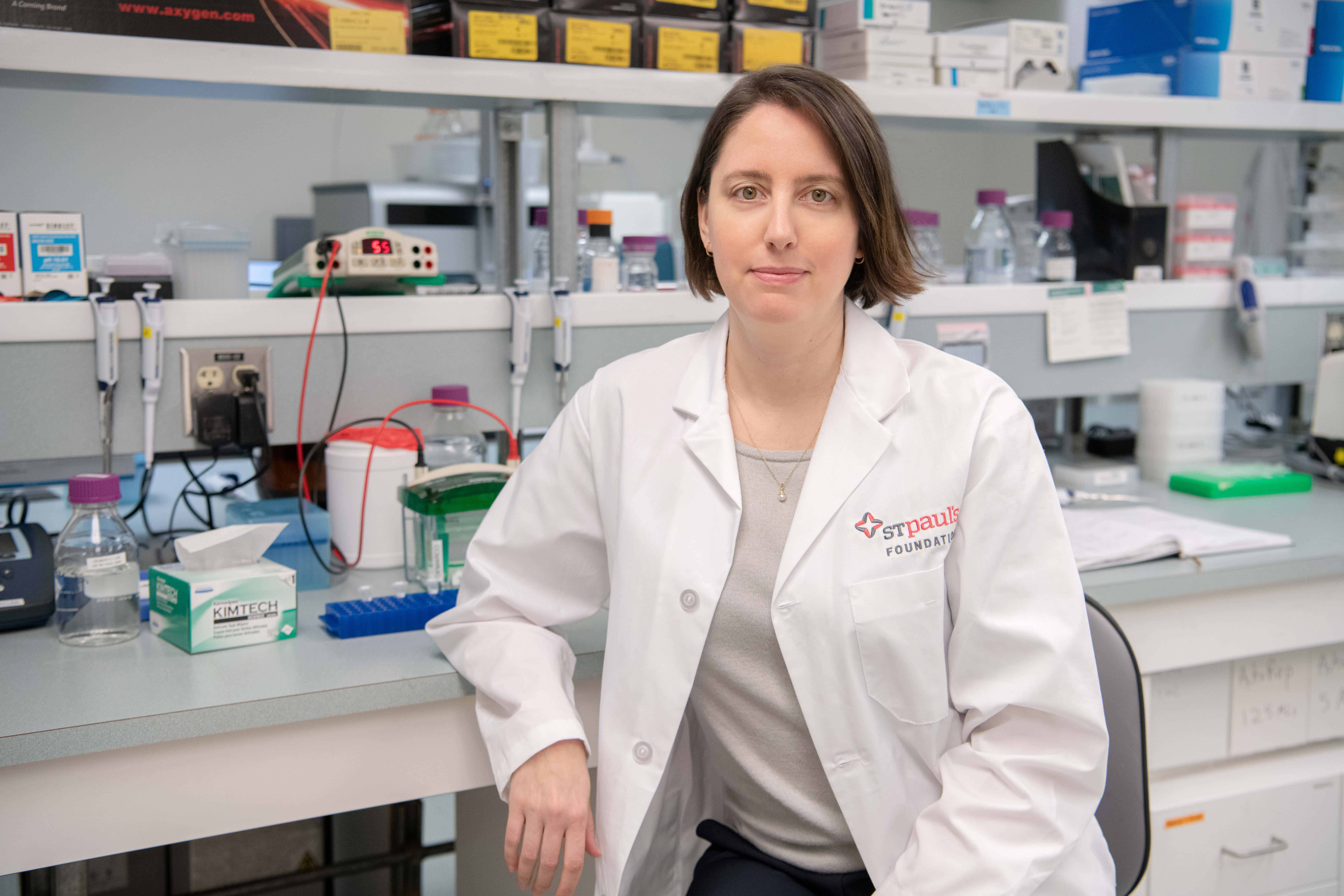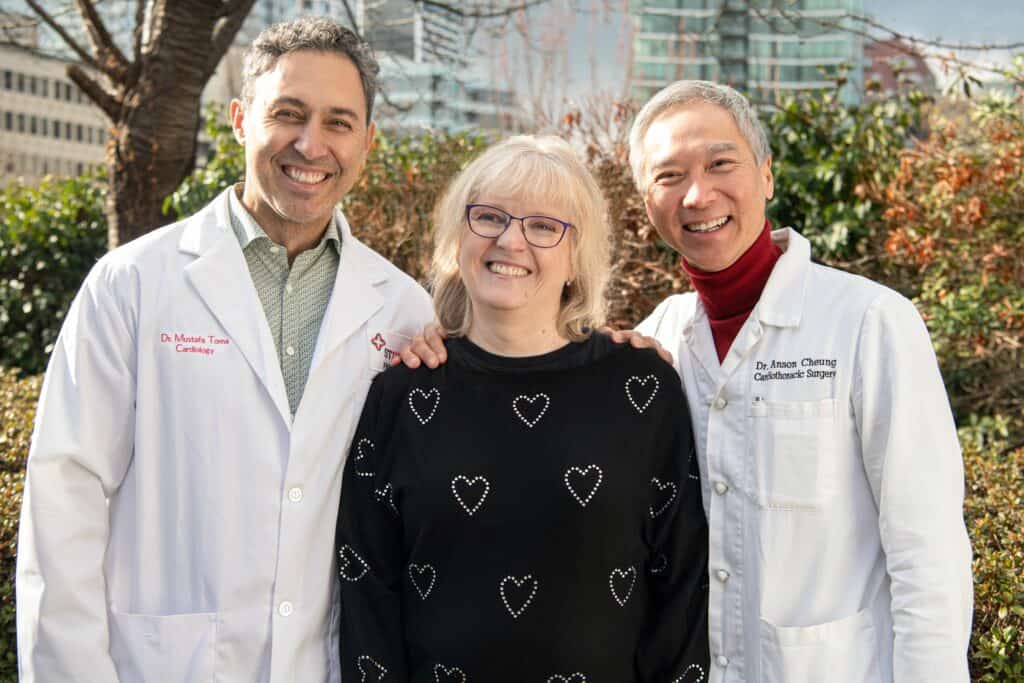Published Promise 2024
What if you could diagnose a patient with Alzheimer’s disease years or even decades earlier than expected? This is one of the questions that inspired Dr. Mari DeMarco, a clinical chemist with Providence Health Care and investigator with the Centre for Heart Lung Innovation at St. Paul’s Hospital, to pursue a solution that could improve care for patients and their families. Dr. DeMarco specializes in building biofluid tests to diagnose neurodegenerative conditions, including Alzheimer’s, which causes progressive neurological decline.
Over a decade ago, Dr. DeMarco started her research program at St. Paul’s, with the help of donor-funded equipment. Her dual goal was to build new biofluid tests to help with earlier and more accurate diagnoses of neurodegenerative disorders and ensure these new tests make the difficult transition from research into health care.
Fast-forward to the present day and St. Paul’s is a national leader in Alzheimer’s disease care with a first-in-Canada testing program evolved from Dr. DeMarco’s research program. Thanks to her team’s efforts, physicians across Canada send samples to St. Paul’s Hospital for testing.
The testing identifies proteins – known as biomarkers – that indicate the presence of a neurodegenerative condition in cerebrospinal fluid. This testing helps physicians diagnose Alzheimer’s earlier and more accurately. With new therapies on the horizon, the future goal is also to begin treatment years before they might otherwise have been able to.
“In the past, a doctor might have to wait until symptoms evolve and the disease progresses to figure out why a person is experiencing challenges with their cognitive abilities,” Dr. DeMarco explains.
This has been a game-changer for Dr. Philip Lee, who works as a geriatrician at St. Paul’s and at the UBC Hospital Clinic for Alzheimer’s Disease and Related Disorders. Dr. Lee has incorporated biomarker testing into his clinical practice for the last few years and calls the biomarkers “revolutionary”.
“It’s particularly helpful for those earlier stages when people have milder symptoms,” he explains. “It gives them more knowledge and power in terms of guiding what pathways they want to follow, which I think is a really valuable gift.”
Dr. DeMarco and her collaborators in BC and across Canada helped move biofluid testing discoveries from research into clinical practice by first studying the impacts of testing with input from British Columbians. Through a study called IMPACT-AD, funded in part by St. Paul’s Foundation, her team collaborated with individuals living with dementia, along with health care providers and community partners, to examine the broad impacts of Alzheimer’s disease biomarker testing.
This first-of-its-kind study brought patient voices to the forefront so researchers could truly understand their needs, and learn how to further drive change in health care.
What they determined was that, even in the absence of a drug to treat the disease, the diagnosis was of immense value to patients, their family members or caregivers, and health care providers.
“We learned from persons living with neurodegenerative disorders like Alzheimer’s that they valued the increased diagnostic certainty that came with biomarker testing. Understanding why they were experiencing challenges with their brain health – and having a clear label for it – helped many move forward and plan for their future,” Dr. DeMarco explains.
Earlier diagnosis affords the person and their family members the ability to make informed decisions about their own disease management and to initiate strategic changes around diet and lifestyle. In addition to positively affecting the longer-term outlook and planning for patients, the IMPACT-AD study showed how biomarker testing optimized their medical care. It reduced the need for additional – and costly – medical testing and visits to different specialists, relieving patient anxiety and stress. Plus, it increased referrals to counselling and other supportive resources for patients and their families.
Dr. DeMarco has recently received provincial Ministry of Health Innovation funding to investigate blood-based biomarkers for Alzheimer’s – allowing testing to be done via a blood test, too.
“We hope that these new blood tests will simplify the diagnostic testing process for patients, and increase accessibility and equity in the health system,” she says.
One of the great things about the CSRC is its ability to integrate and blend the expertise of diverse areas of research and people studying different diseases. We now have diagnostic tools for Alzheimer’s, but my team and I are working hard to fill other diagnostic gaps for related disorders.
Dr. Mari DeMarco

Research like Dr. DeMarco’s is the foundation of the new St. Paul’s Clinical Support and Research Centre (CSRC), which will connect to the new St. Paul’s Hospital via a sky bridge. The CSRC is purpose-built to put people first, bring world-class ideas to life, and advance medical breakthroughs.
Dr. DeMarco is excited about how the new building will allow her to continue to expand upon her research.
“One of the great things about the CSRC is its ability to integrate and blend the expertise of diverse areas of research and people studying different diseases,” she says. “We now have diagnostic tools for Alzheimer’s, but my team and I are working hard to fill other diagnostic gaps for related disorders like Parkinson’s disease and frontotemporal dementia, and to explore technologies that make testing more accessible to those who need it.”
Support research – and researchers – now and in the future at SPH with the CSRC.



